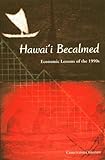Hawaiʻi Becalmed : Economic Lessons of the 1990s / Christopher Grandy.
Material type: TextPublisher: Honolulu : University of Hawaii Press, [2002]Copyright date: ©2002Description: 1 online resource (144 p.)Content type:
TextPublisher: Honolulu : University of Hawaii Press, [2002]Copyright date: ©2002Description: 1 online resource (144 p.)Content type: - 9780824826307
- 9780824862770
- 330.9969/041 21
- online - DeGruyter
- Issued also in print.
| Item type | Current library | Call number | URL | Status | Notes | Barcode | |
|---|---|---|---|---|---|---|---|
 eBook
eBook
|
Biblioteca "Angelicum" Pont. Univ. S.Tommaso d'Aquino Nuvola online | online - DeGruyter (Browse shelf(Opens below)) | Online access | Not for loan (Accesso limitato) | Accesso per gli utenti autorizzati / Access for authorized users | (dgr)9780824862770 |
Frontmatter -- Contents -- Preface -- Acronyms -- 1 Introduction -- 2 The Bubble -- 3 Three Pinpricks -- 4 A Change in Fortune -- 5 A Change in Administration -- 6 COR, ERTF, and Crisis -- 7 The Election -- 8 Second-Term Agenda -- 9 Lessons and Conclusions -- Appendix 1: Economic Revitalization Task Force Proposals -- Appendix 2: The Lingle Plan and Detailed Potential Response -- References -- Index
restricted access online access with authorization star
http://purl.org/coar/access_right/c_16ec
"At the annual average rate of growth Hawaii experienced between 1959 and 1990, the size of the economy would double every 14 years. At the rate of growth experienced between 1991 and 1998, it would take 93 years for Hawaii's economy to double in size."--from the IntroductionWhat happened during the decade of the 1990s that caused Hawaii's once full economic sails to deflate, leaving the economy in the doldrums? What can Hawaii's leaders do to revive economic growth-or can anything be done? What lessons does this period of prolonged economic stagnation hold for those who care about Hawaii's future?The author recounts many of the external and internal events that affected Hawaii during the 1990s, their long-term economic impact, and the issues our elected policymakers must address to restart our economy. After a period of denial, Hawaii's leaders began exploring a wide variety of policies designed to remove perceived competitive barriers and to stimulate the economy. These efforts culminated in policy initiatives that may have assured Governor Ben Cayetano's re-election in 1998. Subsequent economic recovery permitted the pursuit of more questionable economic policies, but the tragic events of 9-11 remind us of the tenuous nature of Hawaii's economic recovery.This highly readable book will challenge students, businesspeople, social scientists, and government leaders to think about the significant issues associated with a near zero-growth economy, and ways to revitalize our economy. A fundamental understanding of Hawaii's position in the global economy-and the challenges it poses for public policy-is essential for all citizens before effective decisions can be made on how to move Hawaii's economy forward.
Issued also in print.
Mode of access: Internet via World Wide Web.
In English.
Description based on online resource; title from PDF title page (publisher's Web site, viewed 02. Mrz 2022)


